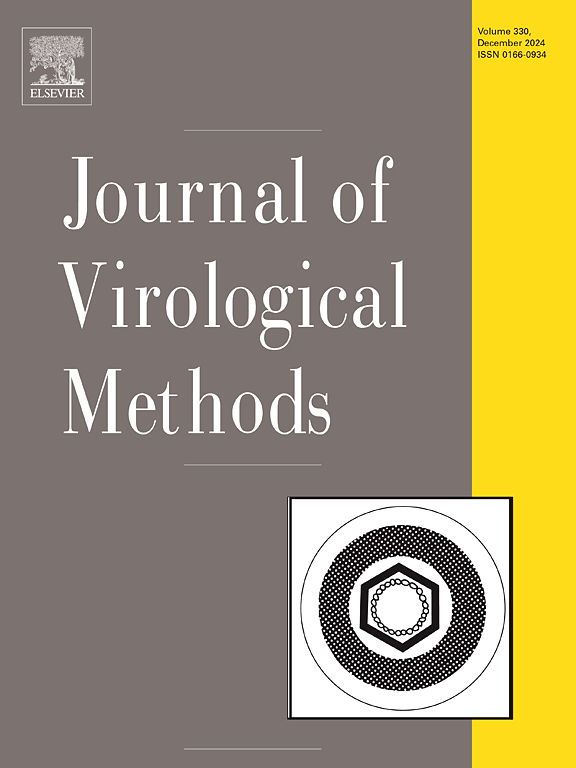Detection of cross-reactivity of antibodies to the N proteins of feline morbillivirus and canine distemper virus in Japanese cat plasma samples
IF 1.6
4区 医学
Q3 BIOCHEMICAL RESEARCH METHODS
引用次数: 0
Abstract
Feline morbillivirus (FeMV) is a globally emerging virus that has been linked to chronic kidney disease (CKD) in infected cats. Immunological assays, such as enzyme-linked immunosorbent assay (ELISA), are important for studying the virus and monitoring its prevalence. A study using rabbit antiserum demonstrated antigenic cross-reactivity between nucleocapsid (N) proteins of FeMV and canine distemper virus (CDV), suggesting not only the risk of false-positive anti-FeMV antibody detection in ELISAs but also potentially false-positive FeMV antigen detection in Western blotting. To examine whether such cross-reactivity occurs in tests using cat plasma samples, we developed ELISAs using affinity-purified recombinant N proteins of FeMV and CDV with expression in Escherichia coli and tested 100 cat plasma samples collected from veterinary clinics in Japan. Twenty samples were found to be positive for anti-FeMV antibodies, while 6 were positive for anti-CDV antibodies. All these latter 6 samples were double-positive for anti-FeMV antibodies. Western blotting with the purified proteins confirmed the specificity of these antibodies to their target viral antigens. A reverse transcription-quantitative PCR assay with a detection limit of 100 copies failed to detect CDV genomic RNA in these 6 double-positive samples. These results strongly suggest the cross-reactivity between anti-FeMV N protein antibodies in cat plasma samples and the CDV N protein. This antigenic cross-reactivity should be considered in future studies using immunological methods employing FeMV or CDV N proteins, or antibodies targeting them.
日本猫血浆中猫麻疹病毒和犬瘟热病毒N蛋白抗体的交叉反应性检测
猫麻疹病毒(FeMV)是一种全球新出现的病毒,与感染猫的慢性肾脏疾病(CKD)有关。免疫分析,如酶联免疫吸附试验(ELISA),对于研究病毒和监测其流行情况很重要。兔抗血清证实了FeMV核衣壳(N)蛋白与犬瘟热病毒(CDV)之间的抗原交叉反应性,提示不仅在elisa检测中存在FeMV抗体假阳性的风险,而且在Western blotting检测中也可能存在FeMV抗原假阳性的风险。为了检验猫血浆样本是否存在这种交叉反应性,我们使用亲和纯化的FeMV和CDV重组N蛋白(在大肠杆菌中表达)开发了elisa,并测试了从日本兽医诊所收集的100只猫血浆样本。20份标本抗femv抗体阳性,6份标本抗cdv抗体阳性。后6份样品抗femv抗体均为双阳性。纯化蛋白的Western blotting证实了这些抗体对其靶病毒抗原的特异性。在这6份双阳性样本中,检测限为100拷贝的逆转录定量PCR检测未能检测到CDV基因组RNA。这些结果强烈提示猫血浆样品中抗femv N蛋白抗体与CDV N蛋白之间存在交叉反应性。这种抗原交叉反应性应该在未来的免疫学研究中考虑,使用FeMV或CDV N蛋白或针对它们的抗体。
本文章由计算机程序翻译,如有差异,请以英文原文为准。
求助全文
约1分钟内获得全文
求助全文
来源期刊
CiteScore
5.80
自引率
0.00%
发文量
209
审稿时长
41 days
期刊介绍:
The Journal of Virological Methods focuses on original, high quality research papers that describe novel and comprehensively tested methods which enhance human, animal, plant, bacterial or environmental virology and prions research and discovery.
The methods may include, but not limited to, the study of:
Viral components and morphology-
Virus isolation, propagation and development of viral vectors-
Viral pathogenesis, oncogenesis, vaccines and antivirals-
Virus replication, host-pathogen interactions and responses-
Virus transmission, prevention, control and treatment-
Viral metagenomics and virome-
Virus ecology, adaption and evolution-
Applied virology such as nanotechnology-
Viral diagnosis with novelty and comprehensive evaluation.
We seek articles, systematic reviews, meta-analyses and laboratory protocols that include comprehensive technical details with statistical confirmations that provide validations against current best practice, international standards or quality assurance programs and which advance knowledge in virology leading to improved medical, veterinary or agricultural practices and management.

 求助内容:
求助内容: 应助结果提醒方式:
应助结果提醒方式:


